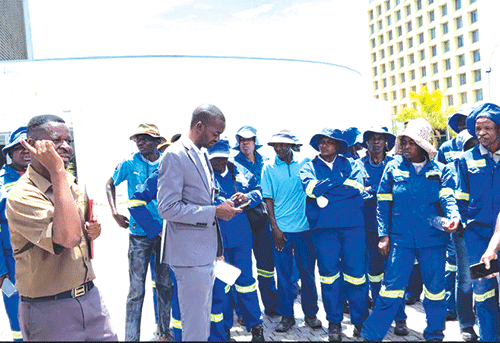Despite discontent concerning the reported unfavourable work conditions faced by fixed-term solid waste workers in the Windhoek municipality, the City of Windhoek insists that it has addressed their demands.
Ward cleaners protested in the streets last week, seeking improved wages, medical benefits, and permanent contracts. Their primary grievance is the difficulty of sustaining themselves and their families on a monthly salary of N$3 300.
The employees granted the City a five-day window to address their grievances, otherwise, they will escalate the matter to the Ministry of Labour and the Head of State.
“With the six-month contracts, we are unable to acquire loans or buy anything on credit. With the high cost of living, we are barely surviving on that amount. Our medical aid benefits are only worth N$250, so what can one get from that amount?” questioned one of the employees, Isack Foloshi.
Responding to questions sent by New Era, City of Windhoek’s spokesperson Lydia Amutenya highlighted key improvements made over the years, saying, “Ward cleaners have experienced double-digit increases in their basic remuneration, surpassing the compensation provided by both the government and private sectors for cleaners”.
She also said the City made provisions for social security benefits and a monetary allowance for medical services, which were not part of the previous contracts with external contractors.
Contrary to this, the employees claim that they only receive N$250 for medical aid which they said to be equivalent to nothing considering economic circumstances.
“Ward cleaners now receive a transport allowance to further enhance their overall remuneration. The City has enhanced health and safety practices, providing personal protective equipment, tools, and equipment. Access to wellness services, including psycho-social support and leadership development, has also been increased,” explained Amutenya.
She also addressed allegations made by workers that the City has removed ward cleaners from permanent employment to become contract workers as the council does not want to carry any financial liability.
“The decision to insource the function, replacing the previous outsourcing arrangement, was a significant move aimed at safeguarding ward cleaners from exploitative practices associated with external contractors,” Amutenya explained.
The City has assured the workers that the council is set to consider pension and housing-related benefits for ward cleaners in the first council meeting of 2024. “This decision is part of the broader evaluation of the business model to ensure sustainability and avoid financial commitments that may burden both the organisation and residents,” said Amutenya.
– ashikololo@nepc.com.na



